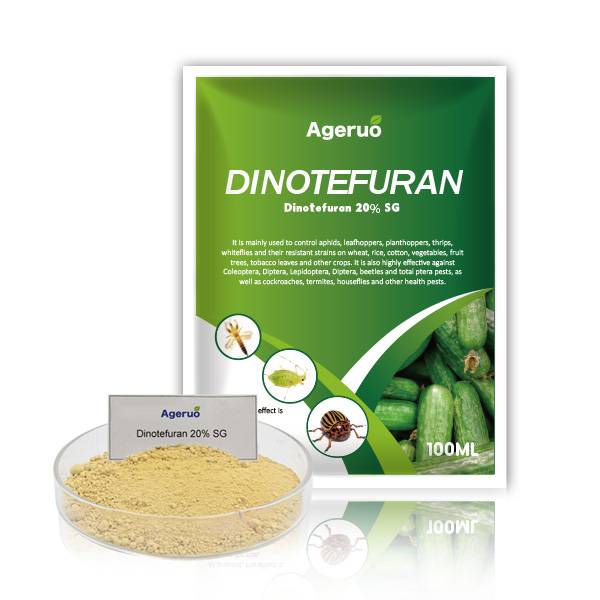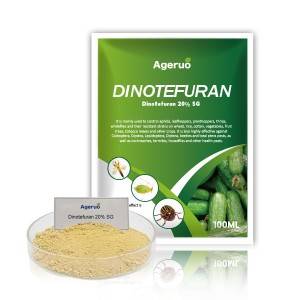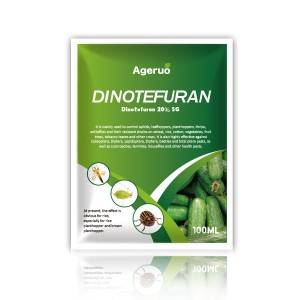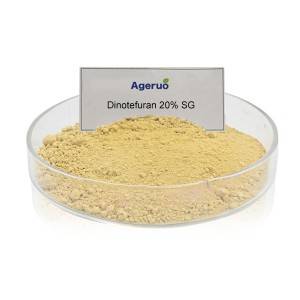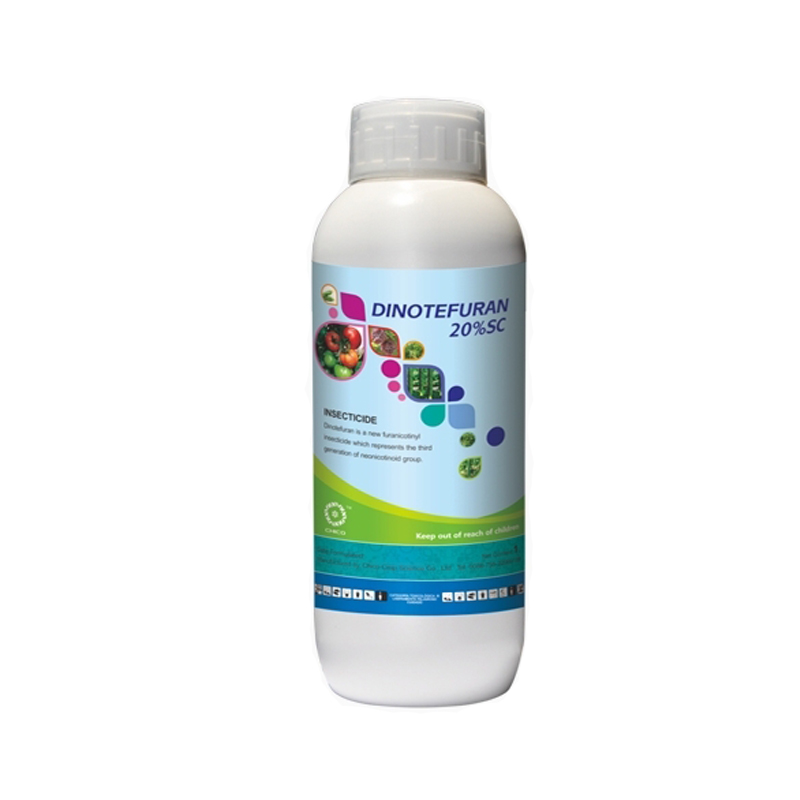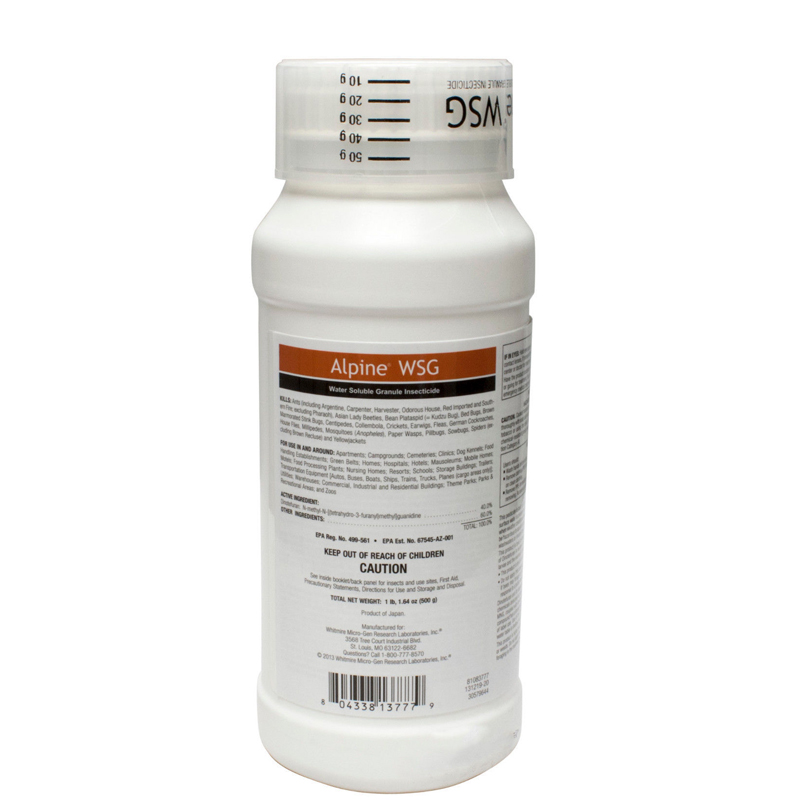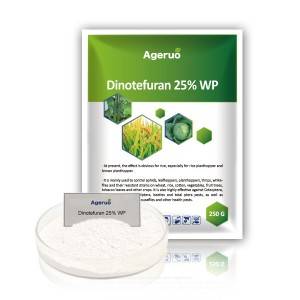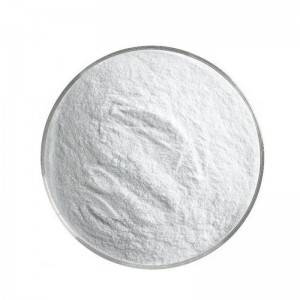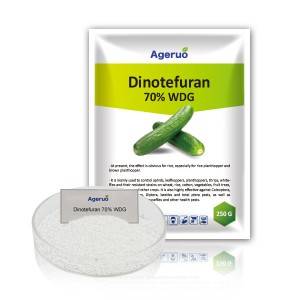Dinotefuran 20% SG | Ageruo New Insecticide for Sale

Dinotefuran Introduction
Dinotefuran insecticide is a kind of nicotine insecticide without chlorine atom and aromatic ring. Its performance is better than that of neonicotinoid insecticides, it has better imbibition and permeation, and it can show obvious insecticidal activity at very low dose.
The mode of action of dinotefuran is achieved by disrupting stimulus transmission within the nervous system of the target insect as it ingests or absorbs the active substance into its body, resulting in cessation of feeding for several hours after exposure and death shortly thereafter.
Dinotefuran blocks certain neural pathways that are more common in insects than in mammals. This is why the chemical is much more toxic to insects than to humans or dog and cat animals. As a result of this blockage, the insect begins to overproduce acetylcholine (an important neurotransmitter), leading to paralysis and eventual death.
Dinotefuran acts as an agonist at insect nicotinic acetylcholine receptors, and dinotefuran affects nicotinic acetylcholine binding in a manner different from other neonicotinoid insecticides. Dinotefuran does not inhibit cholinesterase or interfere with sodium channels. Therefore, its mode of action differs from that of organophosphates, carbamates and pyrethroid compounds. Dinotefuran has been shown to be highly active against a strain of silverleaf whitefly that is resistant to imidacloprid.
Related reading: What are the uses and applications of Dinotefuran?
| Product Name | Dinotefuran 20% SG |
| Dosage Form | Dinotefuran 20% SG 、Dinotefuran 20% WP、Dinotefuran 20% WDG |
| CAS Number | 165252-70-0 |
| Molecular Formula | C7H14N4O3 |
| Brand Name | Ageruo |
| Place of Origin | Hebei,China |
| Shelf life | Dinotefuran |
| The mixed formulatiion products | Dinotefuran 3% + Chlorpyrifos 30% EW Dinotefuran 20% + Pymetrozine 50% WG Dinotefuran 7.5% + Pyridaben 22.5% SC Dinotefuran 7% + Buprofezin 56% WG Dinotefuran 0.4% + Bifenthrin 0.5% GR Dinotefuran 10% + Spirotetramat 10% SC Dinotefuran 16% + Lambda-cyhalothrin 8% WG Dinotefuran 3% + Isoprocarb 27% SC Dinotefuran 5% + Diafenthiuron 35% SC |
Dinotefuran Feature
Dinotefuran not only has contact toxicity and stomach toxicity, but also has excellent absorption, penetration and conduction, which can be quickly absorbed by plant stems, leaves and roots.
It is widely used in crops, such as wheat, rice, cucumber, cabbage, fruit trees and so on.
It can effectively control a variety of pests, including ground pests, underground pests and some sanitary pests.
There are various ways of use, including spraying, watering and spreading.

Dinotefuran Application
Dinotefuran is not only widely used in agriculture for rice, wheat, cotton, vegetables, fruit trees, flowers and other crops. It is also effective to control Fusarium, termite, housefly and other health pests.
It has a wide spectrum of insecticides, including aphids, psyllids, whiteflies, Grapholitha molesta, Liriomyza citri, Chilo suppressalis, Phyllotreta striolata, Liriomyza sativae, green leafhopper, brown planthopper, etc.


Using Method
| Formulation: Dinotefuran 20% SG | |||
| Crop | Fungal diseases | Dosage | Usage method |
| Rice | Ricehoppers | 300-450 (ml/ha) | Spray |
| Wheat | Aphid | 300-600 (ml/ha) | Spray |
| Formulation: Dinotefuran 20% SG Uses | |||
| Crop | Fungal diseases | Dosage | Usage method |
| Wheat | Aphid | 225-300 (g/ha) | Spray |
| Rice | Ricehoppers | 300-450 (g/ha) | Spray |
| Rice | Chilo suppressalis | 450-600 (g/ha) | Spray |
| Cucumber | Whiteflies | 450-750 (g/ha) | Spray |
| Cucumber | Thrip | 300-600 (g/ha) | Spray |
| Cabbage | Aphid | 120-180 (h/ha) | Spray |
| Tea plant | Green leafhopper | 450-600 (g/ha) | Spray |
Note
1. When using dinotefuran in Sericulture Area, we should pay attention to avoid direct pollution of mulberry leaves and prevent the water polluted by furfuran from entering mulberry soil.
2. The toxicity of dinotefuran insecticide to honeybee ranged from medium to high risk, so plant pollination was forbidden at flowering stage.












